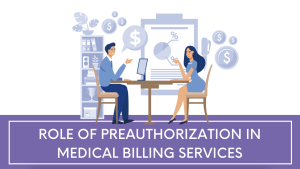In the complex world of medical billing, understanding the various types of authorization is essential for practitioners and healthcare providers alike. Obtaining the necessary authorization is not only vital for ensuring accurate and timely payments but also for avoiding potential legal and financial risks. This article aims to shed light on the different types of authorization in medical billing, highlighting their significance and providing insights into their respective processes and requirements. By familiarizing yourself with these types of authorization, you can streamline your billing procedures and uphold the highest standards of compliance and efficiency in your practice.
Pre-authorization

Definition
Pre-authorization refers to the process of obtaining approval from an insurance provider before a medical service or procedure is performed. It allows the insurance company to review and determine the medical necessity and cost-effectiveness of the proposed treatment plan.
Purpose
The primary purpose of pre-authorization is to ensure that the requested medical service or procedure meets the criteria set by the insurance provider for coverage. It helps prevent unnecessary or inappropriate treatments, reduce healthcare costs, and maintain consistency in the utilization of healthcare resources.
Process
To initiate the pre-authorization process, healthcare providers are required to submit a request to the patient’s insurance company. This request typically includes relevant medical documentation, such as diagnostic tests, medical history, and the proposed treatment plan. The insurance company then reviews the information provided and makes a decision based on its pre-established guidelines and criteria. This decision is communicated back to the healthcare provider, usually within a specified timeframe.
Pre-certification

Definition
Pre-certification, also known as pre-approval, is another type of authorization required for certain medical treatments and procedures. It involves verifying the necessity and appropriateness of a proposed treatment plan before it is performed.
Purpose
The main purpose of pre-certification is to ensure that the chosen medical treatment is medically necessary, according to the insurance provider’s guidelines. This process facilitates effective utilization of healthcare resources and helps prevent unnecessary or redundant procedures.
Process
Healthcare providers must submit a pre-certification request to the patient’s insurance company. This request typically includes relevant medical records, diagnostic tests, and the anticipated treatment plan. The insurance company then reviews the submitted information to assess whether the proposed treatment meets the criteria for coverage. The decision regarding pre-certification is communicated to the healthcare provider within a specified timeframe.
Prior authorization
Definition
Prior authorization is a type of approval required specifically for certain prescription medications. It involves the insurance provider granting permission to cover the cost of a specific medication before it can be dispensed.
Purpose
The purpose of prior authorization is to ensure that the prescribed medication is medically necessary and cost-effective. It helps insurance companies monitor medication utilization, improve patient safety, and control healthcare costs.
Process
When a healthcare provider prescribes a medication that requires prior authorization, they must complete and submit the necessary paperwork to the patient’s insurance company. This paperwork typically includes the prescription details, the patient’s medical history, and any relevant supporting documentation. The insurance company reviews the submitted information to evaluate whether the prescribed medication meets their coverage criteria. The decision is then communicated back to the healthcare provider, who can proceed with dispensing the approved medication.
Insurance verification

Definition
Insurance verification is the process of confirming a patient’s coverage and benefits with their insurance provider. It involves verifying the patient’s insurance details, such as policy number, coverage limits, and co-payment requirements.
Purpose
The purpose of insurance verification is to ensure that the patient’s healthcare services will be covered by their insurance plan. It allows healthcare providers to accurately assess the patient’s financial responsibility and minimize the risk of claim denials or unpaid services.
Process
Prior to providing any healthcare services, healthcare providers or their administrative staff collect the necessary insurance information from the patient. This information is then verified by contacting the patient’s insurance company using various methods, such as phone calls or online portals. Once the insurance details are confirmed, the healthcare provider can determine the patient’s coverage, co-payment amounts, and any applicable deductibles or limitations.
Referral authorization

Definition
Referral authorization is a process that requires healthcare providers to obtain approval from a primary care physician (PCP) or insurance provider before referring a patient to a specialist or specialized medical service.
Purpose
The purpose of referral authorization is to ensure that the requested referral is medically necessary and appropriate. It allows the insurance provider to monitor and control the utilization of specialized services, control costs, and ensure coordinated care.
Process
When a healthcare provider believes that a patient needs specialized care, they must request a referral authorization from the patient’s insurance company or PCP. This request typically includes relevant medical records, diagnostic test results, and the reason for the referral. The insurance company reviews the provided information to determine the medical necessity and appropriateness of the referral. The decision is communicated back to the healthcare provider, who can then proceed with making the referral.
Clinical authorization

Definition
Clinical authorization refers to the approval process required for certain healthcare services or procedures that are not typically covered by insurance plans. It involves a comprehensive review of medical documentation to determine the medical necessity and appropriateness of the requested service.
Purpose
The purpose of clinical authorization is to evaluate the medical need and potential benefits of a non-covered service or procedure. It allows the insurance provider to consider exceptional cases and approve services that are deemed medically necessary despite not being part of the standard coverage.
Process
To initiate clinical authorization, healthcare providers must submit a request to the patient’s insurance company. This request includes detailed medical documentation supporting the medical need for the requested service. The insurance company’s clinical team reviews the provided information and assesses the case on an individual basis. Based on this evaluation, a decision is made to approve or deny the requested service or procedure.
Utilization review

This image is property of www.caplinedentalservices.com.
Definition
Utilization review is a process that involves the evaluation of healthcare services to ensure they are medically necessary, appropriate, and cost-effective. It is typically performed by specialized teams or individuals, such as case managers or utilization review nurses.
Purpose
The purpose of utilization review is to prevent unnecessary or excessive healthcare utilization. It helps insurance companies control costs, ensure quality care, and optimize the use of healthcare resources.
Process
Utilization review is conducted throughout the course of a patient’s treatment, from the initial diagnosis to the completion of the treatment plan. The review team analyzes medical documentation, including diagnostic tests, treatment plans, and progress reports. They assess the medical necessity and appropriateness of the provided care, considering evidence-based guidelines and the insurance company’s coverage criteria. Based on the review, recommendations may be made regarding the continuation, modification, or discontinuation of the treatment plan.
Medical necessity review

Definition
Medical necessity review is a process that focuses specifically on evaluating the medical necessity and appropriateness of healthcare services or procedures. It is typically conducted by medical professionals, such as physicians or nurses, who specialize in reviewing and assessing medical documentation.
Purpose
The purpose of medical necessity review is to ensure that the requested healthcare services or procedures are justified based on the patient’s medical condition. It is aimed at preventing unnecessary or inappropriate treatments, promoting evidence-based medicine, and optimizing patient outcomes.
Process
Medical necessity review involves a thorough evaluation of the patient’s medical records, diagnostic tests, and treatment plans. The reviewing medical professional assesses the medical documentation to determine whether the requested services meet the criteria for medical necessity, as set by the insurance provider. This review process helps ensure that the proposed treatments are safe, effective, and consistent with current medical standards.
Appeals and grievance authorization

Definition
Appeals and grievance authorization refers to the process of challenging an insurance company’s decision to deny coverage or reimbursement for a healthcare service or procedure. It allows patients or healthcare providers to appeal an unfavorable decision and seek a resolution for disputes.
Purpose
The purpose of appeals and grievance authorization is to provide an avenue for resolving disagreements between patients, healthcare providers, and insurance companies. It allows for a fair and impartial review of denied claims or coverage decisions, with the goal of reaching a mutually beneficial outcome.
Process
When an insurance company denies coverage or reimbursement for a healthcare service, the affected party, whether it’s the patient or healthcare provider, can initiate the appeals and grievance authorization process. This typically involves submitting an appeal letter or completing a formal appeals process outlined by the insurance company. The appeal is then reviewed by a designated review board or independent entity, which reassesses the denied claim and reviews any additional supporting documentation provided. Based on this evaluation, a decision is made to uphold or reverse the initial denial.
Workers’ compensation authorization

Definition
Workers’ compensation authorization refers to the approval process required for medical treatment or services related to work-related injuries or illnesses. It involves verifying the medical necessity and appropriateness of the requested treatment within the context of a worker’s compensation claim.
Purpose
The purpose of workers’ compensation authorization is to ensure that the requested medical treatment or services are directly related to the work-related injury or illness. It allows insurance companies to control and manage the expenses associated with workers’ compensation claims while ensuring that injured workers receive appropriate care.
Process
When a healthcare provider recommends medical treatment or services for a work-related injury or illness, they must seek authorization from the worker’s compensation insurance carrier. This typically involves submitting medical records, treatment plans, and diagnostic test results to support the requested treatment. The insurance company reviews the provided information to assess the medical necessity and appropriateness of the requested services. The decision on workers’ compensation authorization is communicated to the healthcare provider or injured worker within a specified timeframe.
In conclusion, in the realm of medical billing, various types of authorization processes play a crucial role in ensuring appropriate and cost-effective healthcare services. Pre-authorization, pre-certification, prior authorization, insurance verification, referral authorization, clinical authorization, utilization review, medical necessity review, appeals and grievance authorization, as well as workers’ compensation authorization, encompass a wide range of processes that aim to streamline healthcare delivery, control costs, and promote optimal patient care. Understanding the definitions, purposes, and processes of these authorizations is essential for healthcare providers, insurance companies, and patients alike to navigate the complex landscape of medical billing effectively.
